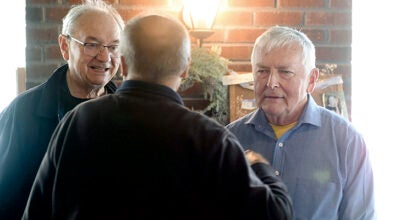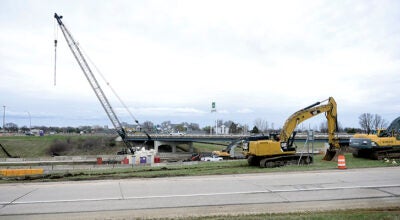County Board District 2 candidates answer questions at candidate forum
Published 11:03 am Monday, September 21, 2020
|
Getting your Trinity Audio player ready...
|
Mower County Board Commissioner Polly Glynn (District 2) and former District 2 Commissioner Ray Tucker answered questions on issues affecting Mower County District 1 during a candidate forum held Sept. 10 on KAUS 1480 AM. The forum was sponsored by the Austin Area Chamber of Commerce.

Polly Glynn

Ray Tucker
The candidates were first asked about which key issues they believe should be the main focus of the County Board. Tucker said he felt transportation was important, but also felt the county should reexamine the tat abatement program.
“(The abatement is) a nice thing, but when you’re picking winners and losers, that gets a little further than the County Board should be involved in,” he said.
Glynn agreed that transportation was important.
“I just want to state that in the last three years, we have been able to repave 100 miles and that’s one-fourth of our roads,” she said. “We’ve done that using the half-cent sales tax and borrowing ahead on that and also the Pleasant Valley wind money and also the wheelage tax. We felt it was prudent to borrow ahead because of the cost of things that could continue to go up, so we’ve really been progressive and we’ve gotten a lot of our roads taken care of in the last three years, which I think all of the rural residents are really appreciating.”
Glynn also advocated for the abatement program.
“We recently approved our 101st applicant for the abatement for the housing industry,” she said. “With that, we’ve increased the value by $38 million within the county and those are five-year abatements. Not all the cities or school districts partook in that, but even with the business abatements, we’ve done SEMA for 15 years and they have a minimum of 40 employees that they have to maintain and they’re currently at 55, so we’re increasing the economy in that area.”
Glynn and Tucker were then asked which existing county economic development programs would you like to see implemented or improved on.
“We have a lot of economic development going on all the time and we’re always interested in any businesses that come forward with proposals to come within the county,” Glynn said. “One of the best things we have to offer is an abatement and we have utilized that. We also borrowed $1 million to a real estate developer that’s going to come in with low and mid-size economic housing. We also have, and (Tucker) was instrumental in putting this in place, $1.5 million set aside only for economic development. That still is $1.5 million; we have not used it, but I always call it the Holy Grail because we want to make sure we use that wisely. I think that not only in Austin, but out in the county too, we want to make sure that all of the businesses understand that we are here to help them develop anything within the county, not just Austin.”
“This coming year we’ll be seeing some more wind energy taking place,” Tucker said. “I’m redoing some of the wind farms south of Grand Meadow. How we handle that will depend on the county’s aggressiveness as far as the companies that are doing it are concerned and as far as damages and so forth to the roads. That’ll be a big undertaking and I foresee that as a pretty big challenge.”
The candidates were next asked how they would work the county budget in a manner to reduce taxes with a projected shortfall in the state budget for the County Aid Program.
“We have to get a handle on the taxes, there’s no doubt about that,” Tucker said. “The amount of money the state gives the county will dictate how much we redo some of these roads. But on the same hand, we might as well capitalize on that wind production as much as we can.”
“Currently, we get $2,546,801 for (CPA),” Glynn said. “That’s projected in our budget for 2021 also. If you take that, it’s four percent of our total budget, so we have made arrangements for hopefully getting our budget levy down to zero, but right now we’re at 1.25 percent. We hope we can get that down even further. We have nine months of reserves right now and, if necessary, we could dip into our reserves for a temporary period of time with a payback for future years.”
Glynn also noted that redoing wind farms will increase the amount of money coming in.
“Currently, we are estimated to have $1,000,115 that will go into the General Fund from the wind and also $670,000, which is the Pleasant Valley wind farm that goes into our Public Works, so we do have some flexibility there so that we can certainly utilize all of those dollars,” she said. “We’re also looking at a solar farm, so that will also bring in some more funds to the county.”
The candidates were then asked if the County Board was doing enough to bring more high-speed broadband into the county. Both agreed it was mainly a state issue.
“I think broadband really came into view with distance learning with the schools this past year,” Glynn said. “I think we always knew there was a problem out there, but I think we weren’t aware of the extent of the problem. We have teachers that live in the rural areas and many students that weren’t able to get proper internet access in order to take care of the distance learning. That’s a state or federal funded issue; I think we have to be more progressive with our legislators to try and get broadband funded.”
“It is the responsibility of the state to supply that,” Tucker said. “The county’s role would be pretty small in pushing that, but the communications world is always fast moving.”
Tucker and Glynn were next asked how they would help local businesses affected by COVID-19.
“I guess we’ll have to leave it up to the experts as far as getting the virus controlled and move forward, but it’ll be very rough doing it,” Tucker said.
Glynn noted that the county is working on helping local businesses through CARES Act funds.
“The county received, through the CARES Act, $4.9 million and it’s very specific in how that has to be spent and it’s going to be audited very carefully,” she said. “Out of that, we put $1.25 million into small business grants. Those are 50 employees or less and they’re $10,000 maximum grants.”
Glynn also said the County Board and DCA “surprised and pleased” by the number of businesses that applied.
“The CARES Act funds certainly helped the county,” she said. “We are in the process of making sure we have enough laptops for all of our employees. We’re going to cut down our Health and Human Services to 75 percent of who was in there before on a rotating basis. We’ll have 25 percent who will be working from home. Many of those expenses are taken care of through the CARES Act. We want our businesses to be taken care of too.”
Lastly, the candidates were asked if the County Board should have stepped in earlier to cancel the Mower County Fair until 2021.
“The role of the County Board with the County Fair is that we own all of the (Mower County Fairground) buildings,” Glynn said. “The fair has its own board full of many very prominent business people in the area who took that decision to heart. Our role was not to step in and tell them what to do with their business. We knew that in the end, those people would make the right decision. When the (Minnesota) State Fair was shut down and most of the other fairs were shut down, I think they saw the writing on the wall. They held out as long as they could to give hope that maybe there was something that could be done so that we could have the fair, but it was the responsibility of the Fair Board to make that decision.”
“I believe that the Fair Board, underneath their own guidelines, would make that call, not the County Board,” Tucker said. “The county’s investment out there is strictly in the properties; running of the fair is strictly up to (the Fair Board).”






